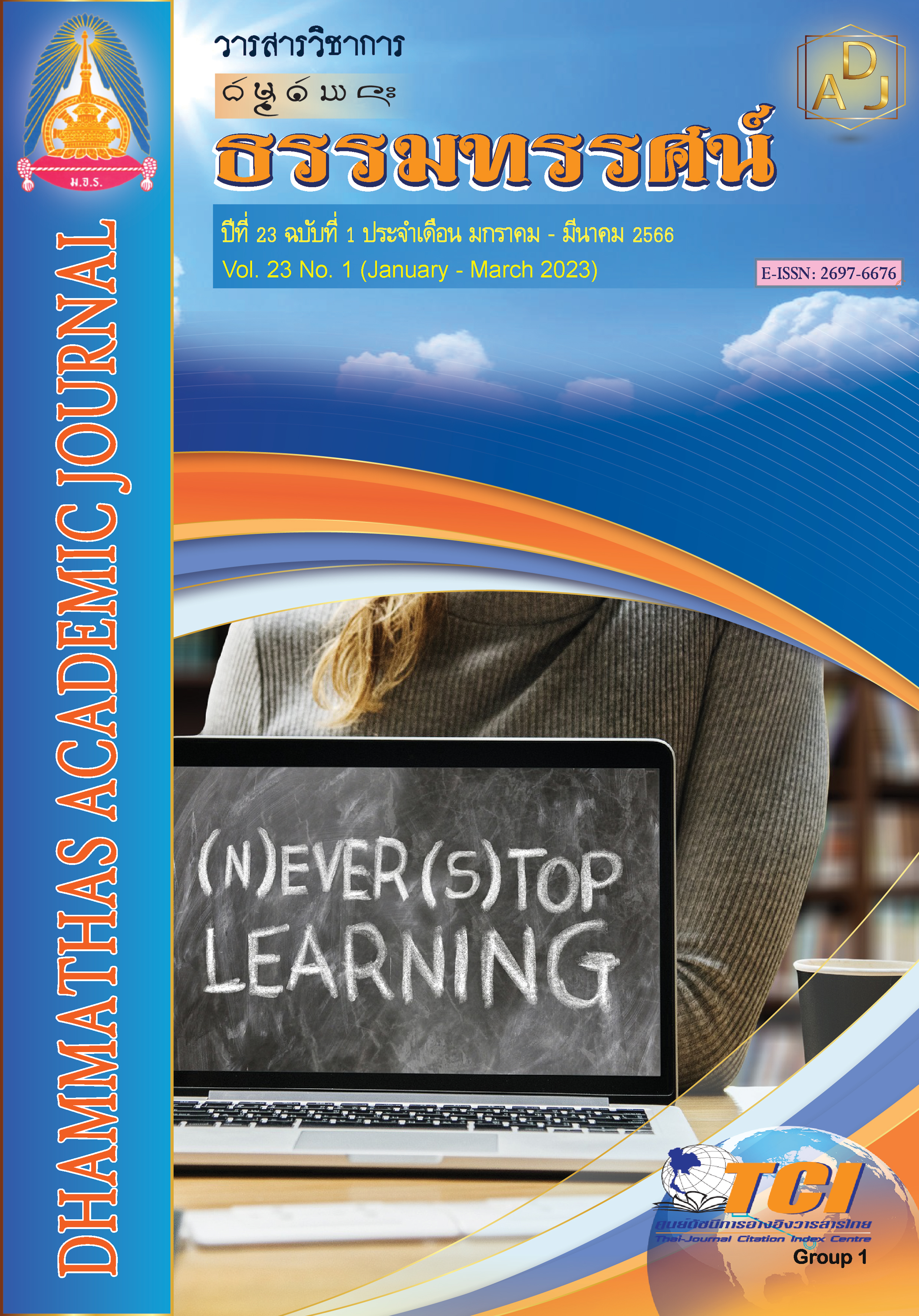Management according to the Philosophy of Sufficiency Economy In Muang Suang Sub-District Municipality, Mueang Suang District, Roi Et Province
Main Article Content
Abstract
This research the objectives were: 1) to study the sufficiency economy of Muang Suang Sub-district Municipality, 2) to study the application of the Sufficiency Economy Philosophy in the organization management of Mueang Suang Sub-district Municipality. It is qualitative research that uses a participatory action research method. which collected data from a group of key informants and key participatory participants by purposively selecting 35 people, including municipal personnel and people in the municipality. The data were analyzed for content, categorized, interpreted and presented the study results by analytical description.
The results showed that:
1. Muang Suang Sub-district Municipality has a sufficiency economy in administration, planning and making plans, working side to pass from generation to generation, internal management to be an organization of happiness and internal management to be an organization of benefit and happiness.
2. Muang Suang Sub-district Municipality can apply the philosophy of sufficiency economy which is transparent administration with good governance, not exploit not operating illegally, no complaints, the price agreement and tender for a transparent procurement. Planning and making plans with the participation of the people's sector at every step, an annual development plan has been announced and monthly budget expenditures are reported to the public in many channels. Planning work to be passed on from generation to generation by encouraging the creation of youth groups that work continuously from generation to generation by including the youth group's project in the annual budget expenditure plan. Internal management to be an organization of happiness knowledge is managed through monthly discussions, personnel have a good relationship with each other, love unity, help each other, live together happily. Internal management to be an organization of benefit and happiness can reduce the cost of personnel wages to use the remaining money to spend on other developments.
Article Details

This work is licensed under a Creative Commons Attribution-NonCommercial-NoDerivatives 4.0 International License.
เพื่อให้เป็นไปตามกฎหมายลิขสิทธิ์ ผู้นิพนธ์ทุกท่านต้องลงลายมือชื่อในแบบฟอร์มใบมอบลิขสิทธิ์บทความ ให้แก่วารสารฯ พร้อมกับบทความต้นฉบับที่ได้แก้ไขครั้งสุดท้าย นอกจากนี้ ผู้นิพนธ์ทุกท่านต้องยืนยันว่าบทความ ต้นฉบับที่ส่งมาตีพิมพ์นั้น ได้ส่งมาตีพิมพ์เฉพาะในวารสาร วิชาการธรรม ทรรศน์ เพียงแห่งเดียวเท่านั้น หากมีการใช้ ภาพหรือตารางของผู้นิพนธ์อื่นที่ปรากฏในสิ่งตีพิมพ์อื่นมาแล้ว ผู้นิพนธ์ต้องขออนุญาตเจ้าของลิขสิทธิ์ก่อน พร้อมทั้ง แสดงหนังสือที่ได้รับการยินยอมต่อบรรณาธิการ ก่อนที่บทความจะได้รับการตีพิมพ์References
โฆสิต ปั้นเปี่ยมรัษฎ์. (2561). แนวทางการพัฒนาประเทศตามปรัชญาเศรษฐกิจพอเพียง. เข้าถึงได้จาก http://www.stabundamrong.go.th/web/book/50/b5_50.pdf
ไชยรัตน์ เจริญสินโอฬาร. (2545). วาทกรรมการพัฒนา. กรุงเทพฯ: วิภาษา.
เบญจวรรณ บุญโทแสง และคณะ. (2563). การศึกษาระดับความเป็นเศรษฐกิจพอเพียงของเทศบาลตำบลท่าม่วง อำเภอเสลภูมิ จังหวัดร้อยเอ็ด. วารสารสังคมศาสตร์ นิติรัฐศาสตร์, 4(2), 23-50.
มูลนิธิชัยพัฒนา. (2565). ปรัชญาของเศรษฐกิจพอเพียง. เข้าถึงได้จาก https://www.chaipat.or.th
สำนักงานคณะกรรมการป้องกันและปราบปรามการทุจริตแห่งชาติ. (2564). ประกาศสำนักงาน ป.ป.ช. เรื่อง ผลการประเมินคุณธรรมและความโปร่งใสในการดำเนินงานของหน่วยงานภาครัฐ. เข้าถึงได้จาก https://www.nacc.go.th/files/article/attachments/26857036e7085734a4d4834680908add1ecde24.pdf
สุรยุทธ์ จุลานนท์. (2561). เอกสารการประชุมชี้แจงแนวทางการพัฒนาประเทศตามปรัชญาเศรษฐกิจพอเพียง. เข้าถึงได้จาก http://www.stabundamrong.go.th/web/book/50/b5_50.pdf
อภิชัย พันธเสน และคณะ. (2560). ยั่งยืน มีความสุขจากประโยชน์สุขด้วยเศรษฐกิจพอเพียง: หนึ่งทศวรรษครึ่งแห่งการวิจัยเพื่อขับเคลื่อนเศรษฐกิจพอเพียง (2547-2559). กรุงเทพฯ: สำนักงานกองทุนสนับสนุนการวิจัย (สกว.).
Best, S. (2001). A Beginner’s Guide to Social Theory. London: Sage.
Ritzer, G. (1993). The McDonaldization of Society: An Investigation into the Changing Character of Contemporary Social Life. London: Sage.

